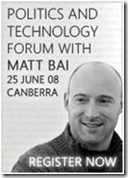 Australia’s mobile phone carriers may not completely grok Apple’s new iPhone 3G, but they know it’ll bring them customers — because they’re all scrambling to be Steve Jobs’ iPhone bitches. It’s an embarrassing spectacle.
Australia’s mobile phone carriers may not completely grok Apple’s new iPhone 3G, but they know it’ll bring them customers — because they’re all scrambling to be Steve Jobs’ iPhone bitches. It’s an embarrassing spectacle.
Three carriers have announced packages available from tomorrow: Telstra, Optus and Vodafone. (Presumably 3, who’ve been asking their customers to beg for iPhones, haven’t bent over far enough.) There’s a comparison over at news.com.au.
According to my sources, all three Aussie telcos have bent over even further than US carrier AT&T. Apple already demands a bigger subsidy from carriers than other smartphone manufacturers. In the US, for example, AT&T pays Apple US$325 per unit compared with the usual $200 or so. However two individuals working within Telstra confirm that all three telcos offering iPhone here are also paying Apple an ongoing percentage of revenue. AT&T has escaped that revenue-sharing deal, but not the Aussies — and that’s presumably reflected in the somewhat disappointing plans on offer.
All three Australian carriers have missed the key point. Yes, iPhone can make phone calls. But its true role is a pocket-sized internet-connected computer.


